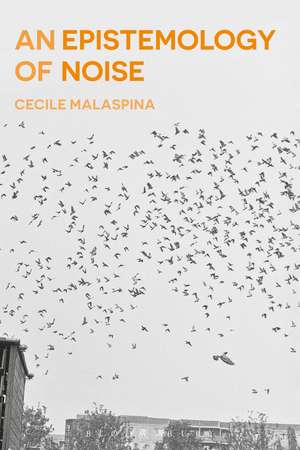An Epistemology of Noise
Autor Cecile Malaspina Prefață de Ray Brassieren Limba Engleză Hardback – 30 mai 2018
| Toate formatele și edițiile | Preț | Express |
|---|---|---|
| Paperback (1) | 231.06 lei 6-8 săpt. | |
| Bloomsbury Publishing – 27 noi 2019 | 231.06 lei 6-8 săpt. | |
| Hardback (1) | 715.73 lei 6-8 săpt. | |
| Bloomsbury Publishing – 30 mai 2018 | 715.73 lei 6-8 săpt. |
Preț: 715.73 lei
Preț vechi: 1028.36 lei
-30% Nou
Puncte Express: 1074
Preț estimativ în valută:
136.99€ • 142.48$ • 114.80£
136.99€ • 142.48$ • 114.80£
Carte tipărită la comandă
Livrare economică 13-27 martie
Preluare comenzi: 021 569.72.76
Specificații
ISBN-13: 9781350011786
ISBN-10: 1350011789
Pagini: 256
Dimensiuni: 156 x 234 mm
Greutate: 0.54 kg
Editura: Bloomsbury Publishing
Colecția Bloomsbury Academic
Locul publicării:London, United Kingdom
ISBN-10: 1350011789
Pagini: 256
Dimensiuni: 156 x 234 mm
Greutate: 0.54 kg
Editura: Bloomsbury Publishing
Colecția Bloomsbury Academic
Locul publicării:London, United Kingdom
Caracteristici
Constructs a way of understanding noise that crosses between scientific, social scientific, aesthetic and technological registers
Notă biografică
Cecile Malaspina is a visiting lecturer at the Royal College of Art, UK. She is the translator of G. Simondon's On the Mode of Existence of Technical Objects, (forthcoming), and, together with Michael Zimmermann, of E. Morin's Methode II (forthcoming).
Cuprins
Foreword by Ray BrassierAcknowledgementsNote on TextList of AbbreviationsIntroductionPart 1 Concepts: Information Entropy, Negentropy, NoiseI How to Draw the Line between Information and NoiseII Entropy as 'Freedom of Choice'III Information Entropy and Physical EntropyIV The Idea of 'Potential Information'V Physical Concepts of Information and Informational Concepts of PhysicsVI Information as Process Rather Than ContentVII To Think about Information as a Process of IndividuationVIII Redundancy and NecessityIX Logic and Freedom of ChoiceX Noise as Spurious UncertaintyXI NegentropyXII Complexity on the Basis of NoiseXIII The Astigmatism of IntuitionXIV The Path of DespairPart 2 Empirical NoiseI On the Transduction of the Concept of NoiseII Accidental Information, Predictable Noise III Ready-Made InformationIV Cosmic Background Radiation V Noise in the Gap between NarrativesVI Noise in FinanceVII Statistics: The Discipline of the PrinceVIII The Man without Qualities IX Noise Abatement: The Dawn of Noise X Noise Pollution XI Toxic, Viral, Parasitic Part 3 The 'Mental State of Noise' I The Crossroads: Mathematical, Technical, Empirical and Subjective NoiseII Internal Chaos, Terror and Confusion III The Vicious Whir of SensationsIV Keat's Negative CapabilityV Closure to Noise and the Paradox of the Declining LifeVI The Catastophic Reaction to Noise VII Anxiety VIII Order IX Control X The Helmsman Metaphor: Kybernetes XI The Helmsman in Plato's Alcibiades DialogueBibliography Index
Recenzii
This is one of the freshest intellectual works I have read in recent years. If you did not previously recognize the philosophical significance of Claude Shannon, Warren Weaver, and Norbert Wiener, you will after reading this book. Shannon's paradoxical claim that information and noise are both forms of entropy is revived by Malaspina and developed with ideas drawn from Gilbert Simondon and Nicholas of Cusa. The result is a challenging and compelling experience for the reader, who will want to study this book multiple times.
The chapters that form this book are like cuts in a diamond, the precision of which is a thing of beauty. Bringing presuppositions to the fore, little is taken for granted when approaching noise and how to understand it. This is a philosophy of noise that is ultimately freeing and demands to be shared.
The received view that we now live in information societies obscures a more unsettling premise. For noise is not just intrinsic to information: as Cecile Malaspina contends, noise is rather the very basis of information. Information societies are then noise societies. This startling insight requires the resetting-or rather the upsetting- of basic categories across the board: for communication, sound, physics, biology, social organisation and, as Malaspina argues, of categorization itself. Noise is therefore primary and significant, yet its theorization is a demanding and necessarily transdisciplinary task. Epistemology of Noise attends to that task with rigour and precision. As such, Malaspina has written an establishing text for a new uncontainable field of noise studies.
This important study offers a rewarding exploration of its subject, not the least by revealing the deeper philosophical underpinnings of the mathematical and scientific theories of information and noise. The book rightly places them in complex relationships to each other, and against an uncritical opposition between them that has prevented us from understanding the nature of these relationships, and of noise and information themselves, for so long.
The chapters that form this book are like cuts in a diamond, the precision of which is a thing of beauty. Bringing presuppositions to the fore, little is taken for granted when approaching noise and how to understand it. This is a philosophy of noise that is ultimately freeing and demands to be shared.
The received view that we now live in information societies obscures a more unsettling premise. For noise is not just intrinsic to information: as Cecile Malaspina contends, noise is rather the very basis of information. Information societies are then noise societies. This startling insight requires the resetting-or rather the upsetting- of basic categories across the board: for communication, sound, physics, biology, social organisation and, as Malaspina argues, of categorization itself. Noise is therefore primary and significant, yet its theorization is a demanding and necessarily transdisciplinary task. Epistemology of Noise attends to that task with rigour and precision. As such, Malaspina has written an establishing text for a new uncontainable field of noise studies.
This important study offers a rewarding exploration of its subject, not the least by revealing the deeper philosophical underpinnings of the mathematical and scientific theories of information and noise. The book rightly places them in complex relationships to each other, and against an uncritical opposition between them that has prevented us from understanding the nature of these relationships, and of noise and information themselves, for so long.
